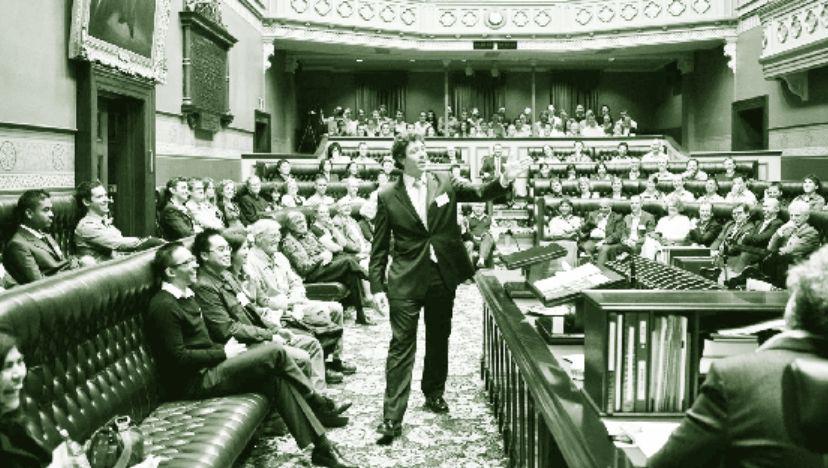如何赢得辩论,总统辩论或其他
2013-04-07
President Obama and former governor Mitt Romney have teams of advisors and aides to help them prepare for their three debates. But what about the rest of us who would like some help winning an argument—at work, at school or at home?
For advice, we asked two experts at Wake Forest University in Winston-Salem, North Carolina. Allan Louden chairs[任教授职位] the Department of Communication. Assistant professor Jarrod Atchison is the director of debate. His first piece of advice is to know your audience.
Jarrod Atchison: Before you know if youve won or you lost, you have to know who the audience is or who the judge is. And so in everyday argumentation some people think that logic alone will prevail[占上风] when sometimes thats not the most persuasive[有说服力的] form of argument in a given situation. So you have to know your audience and what they consider to be relevant[相关的] information for the debate at hand[即将到来].
Second, find a “universal principle” that everyone in the room—from the audience members to your opponent[敌手,对手]—can agree to. Jarrod Atchison says if you argue from that principle, “then you do not have to fight the fight about the basics of the evidence.”
Third, he says the best debaters are the best listeners. They listen to what their opponent is saying, instead of just repeating their own position.
And fourth, he says, “be very careful in deploying[使用] history in argumentation.” Some people think that having one strong historical example to support their side will win the argument. But their opponents may have other historical examples to support their side.
Atchison: And a very good debater will always use that to their advantage by saying, “Well, you may have identified one example that supports your direction. But heres a larger, more important example that supports my side.”
奥巴马总统和前州长米特·罗姆尼都有各自的顾问团队来帮助他们准备三场(总统)辩论。但对我们这些想在工作场合、学校里或者是家里赢得辩论的人又有什么好的建议呢?
我们请来了(美国)北卡罗来纳州温斯顿-赛纳姆市的维克森林大学的两位专家——传播系教授艾伦·劳登和担任辩论总监的助理教授贾罗德·艾奇逊——为我们指点迷津。艾奇逊的第一条建议是了解你的观众。
贾罗德·艾奇逊:在了解辩论是成是败之前,你必须先了解你的听众或者评委。因此,在日常的辩论中,有人认为逻辑这个单一元素就会让自己占上风,但在某些特定情况下,逻辑并不是最有说服力的论证形式。所以,你必须了解你的观众,以及对他们来说什么是即将到来的这场辩论的相关信息。
第二,找到一个能让现场每一个人——从全场观众到你的对手——都同意的“通用法则”。贾罗德·艾奇逊说如果你以这一法则为出发点辩论,“那么你不需要与基本的知识作斗争。”
第三,他说最好的辩论家也是最好的聆听者。他们聆听对手讲的话,而不只是重复自己的论点。
第四,他说,“在辩论过程中引用历史(事件)要非常谨慎。”有人认为用一个有力的历史事例来支持己方论点就能够赢得辩论。但对方可能提出其他历史事例来支持他们的论点。
艾奇逊:一个优秀的辩手总会说“好吧!你可能有一个有用的论据来支持你方观点。但我们有一个(影响)更深远的、更重要的例子来支持我方论点。”以此作为自己的优势。
Next, some advice about terms to avoid. Atchison: Where people tend to get in trouble is they try to use phrases like “always”or “never,”and we find these in our relational[相关的] arguments as well, that nothing draws the ire[忿怒] of an audience than an overstated[夸张的] claim. Because then all the other person has to do is to make a little bit more nuanced[有细微差别的] argument about where under certain conditions a particular argument or Plan A makes sense versus[与……相对] Plan B. So one of the major mistakes people make is they try to think that theyre arguing in absolutes[绝对真理] to sound more persuasive, when in actuality it comes across[给人……印象] as too ideological[意识形态的] and not nuanced enough.
Professor Alllan Louden says debaters should be careful not to underestimate[低估] their audiences ability to follow the arguments.
Allan Louden: Theyre kind of assuming the first-time audience that doesnt know much, and they tend to pander[迎合], when in fact if you were to step it up a notch[等级] and actually say what your position was and defend it with support, etcetera[等等] would be well-received[受到欢迎的,被认可的].
In the end, he says, people have to make up their mind for themselves.
下面介绍一些需要避免的错误。艾奇逊:使人们陷入困境的往往是他们试图使用诸如“总是”或“从不”等短语,而我们发现这些现象也存在于我们的相关辩论中,没有什么比一个夸张的论点更能惹怒观众的了。因为那样一来,其他人所要做的就是为论点做些微调整,使其在某些情况下,一个特定的论点或“计划A”在与“计划B”的对抗中显得有理。因此,人们会犯的一个重大错误就是为了使论点听起来更有说服力,他们设想自己所辩论的话是绝对真理。事实上,这让人觉得过于意识形态,而且留下不够细致的印象。
艾伦·劳登教授认为辩论者应该小心,不要低估观众了解辩论的能力。艾伦·劳登:他们假定第一次听的观众知道得不多,他们倾向于迎合(观众)。但事实上,如果你提高自己的层次,确实地讲出己方论点、在事例的支持下辩论等等,那么你就会得到观众的认可。
最后,他说,人们不得不自圆其说。
Louden: Ultimately[最终,根本] everybody persuades themselves, and the best message is that which solicits[怂恿] the person to whatever part of their cognitive[认知的]makeup[构造] says that this is a good idea. Typically people see things from a point of view, so you pick a language which is in their language and you argue from a perspective[观点] which says “This is to your advantage because,” things that they kind of agree with. People ultimately persuade themselves.
So what should you do if you feel like you are losing an argument? Jarrod Atchison says the first thing to do is to be willing to recognize what parts of your opponents arguments are persuasive.
Atchison: The best debaters in the country, from an academic[学术的] perspective and in our daily lives, are the people that can acknowledge what parts of their opponents arguments are correct, make sense, are persuasive—“however,” and then provide a warrant[根据] after the however that explains why their position is still more persuasive in the end.
Professor Atchison says everyone can improve their argumentation skills. There are lots of books that people can read.
Atchison: But in my experience the best resource is evaluating your own arguments in action. And that can be something as self-reflective[反思的] as sitting back[休息] and asking yourself, “How did that conversation go? Was it where I wanted it to end up? Were there moments when I found myself acting reactionary[反动的] rather than conceding[弃权让步] that my opponent may have had something to say there?”
That was Jarrod Atchison, director of debate at Wake Forest University in North Carolina. Oh, and one more thing. He tells us that his wife is one of the top debaters in the country. So we wondered what the conversations are like around the dinner table.
Atchison: Well, the best debaters know what arguments are worthy to argue about, and so we find that oftentimes[时常] we dont have as many arguments as our peers[同龄人] because we know what the nuclear[核心的] option looks like.
劳登:从根本上说,每个人都在说服自己,而最佳信息就在于怂恿自己“这是个好主意”的认知构造的任一部分中。通常人们都是从一个角度看事情的,所以你用他们能听懂的语言,并从一个人们都同意的“这是对你有利的,因为……”的角度展开辩论。人们最终会自己说服自己。
那么如果觉得自己好像要输掉辩论时,你应该做些什么呢?贾罗德·艾奇逊认为你首先要做的是乐于承认对手的哪些论点是有说服力的。
艾奇逊:这个国家的最佳辩手——从学术辩论到我们的日常生活——是那些能够承认对手的部分观点是正确的、言之有理的和有说服力的人——“但是”,在“但是”之后提供合理的证据来最终解释为什么他们的论点仍然更有说服力。
艾奇逊教授说每个人都能提高自身的辩论能力,有许多书是人们可以阅读的。
艾奇逊:但就我个人的经验而言,最好的办法是在实战中提高自己。抽空坐下来反思,问自己“对话进行得如何?是在我想结束的地方结束的吗?在哪些时刻发现自己反应过激,而不是考虑到那时我的对手也许有话要说?”
这就是贾罗德·艾奇逊——北卡罗来纳州维克森林大学的辩论总监。噢,还有一件事,他告诉我们,他的妻子也是美国最佳辩手之一。因此我们想知道他们用餐时的谈话是怎么样的。
艾奇逊:哦,最优秀的辩论家知道什么论题值得辩论,所以我们常常发现自己不像其他夫妇,我们没什么好争辩的,因为我们知道核心选项是什么。
